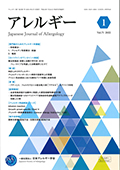
- |<
- <
- 1
- >
- >|
-
Akira Matsuda2022 Volume 71 Issue 8 Pages 913-919
Published: 2022
Released on J-STAGE: September 09, 2022
JOURNAL FREE ACCESSDownload PDF (1850K) -
Risa Tamagawa-Mineoka2022 Volume 71 Issue 8 Pages 920-924
Published: 2022
Released on J-STAGE: September 09, 2022
JOURNAL FREE ACCESSDownload PDF (717K)
-
Minoru Gotoh2022 Volume 71 Issue 8 Pages 926-930
Published: 2022
Released on J-STAGE: September 09, 2022
JOURNAL FREE ACCESSDownload PDF (956K)
-
Yoshiko Iwai2022 Volume 71 Issue 8 Pages 931-933
Published: 2022
Released on J-STAGE: September 09, 2022
JOURNAL FREE ACCESSDownload PDF (236K)
-
Baku Oyama, Takahiro Tsuburai, Yuko Komase, Ayami Ono, Hiromi Muraoka, ...2022 Volume 71 Issue 8 Pages 934-943
Published: 2022
Released on J-STAGE: September 09, 2022
JOURNAL FREE ACCESSBackground: Our hospital in the western part of Yokohama City managed adult bronchial asthma patients via a coordinated care system with primary care clinics. The aim of the system is to provide effective daily and emergency medical care.
Methods: The study comprised 288 adult stable asthmatics (201 women) who were examined at Yokohama City Seibu Hospital between Jan 2009 and May 2018 and who were being managed under our coordinated care system at one of 80 primary clinics or hospitals.
Results: Of the 288 patients enrolled, 188 continued, 37 ended under management, and 63 dropped out from this system. The drop-out rate was highest at visit 1 (9%). The main reasons for end of cooperation under management were readjustment of asthma treatment and treatment for other diseases. The reasons for dropping out were low adherence, older age, and mild symptoms. There was a significant tendency in the frequency of patients who continued, ended under management, or dropped out (x2: 26.053, p=0.016), and the drop-out rate was significantly higher at visit 1. Comparing the characteristics of the patients who continued, ended under management, and dropped out within two visit, those who had dropped out were significantly younger (p=0.0067) and their duration of asthma was shorter (p=0.0009). The frequencies of emergency department visit and hospitalization were high until visit 2, but no significant trends were observed.
Conclusion: Our coordinated care system managed 188 asthmatic patients (65.2%) properly. Patients with low adherence tended to drop out from the system at visit 1.
View full abstractDownload PDF (875K)
-
Machiko Matsumoto-Sasaki, Kaoruko Shimizu, Masanobu Suzuki, Masaru Suz ...2022 Volume 71 Issue 8 Pages 944-948
Published: 2022
Released on J-STAGE: September 09, 2022
JOURNAL FREE ACCESSAt the time of writing of this manuscript, four biologics were clinically available for the treatment of severe asthma, and there were no established recommendations for the period of administration or timing of discontinuation of each biologic. We present a case of severe asthma that was well controlled with long-term omalizumab treatment; however, prolongation of the dosing intervals resulted in disease exacerbation that was refractory to omalizumab treatment despite the restoration of the recommended interval of administration. We suspect that the prolonged dosing intervals might have reduced the efficacy of omalizumab. We report this case because dosing intervals should be considered in clinical practice in cases of long-term omalizumab treatment.
View full abstractDownload PDF (392K)
-
[in Japanese]2022 Volume 71 Issue 8 Pages 949-951
Published: 2022
Released on J-STAGE: September 09, 2022
JOURNAL FREE ACCESSDownload PDF (294K) -
[in Japanese]2022 Volume 71 Issue 8 Pages 952-953
Published: 2022
Released on J-STAGE: September 09, 2022
JOURNAL FREE ACCESSDownload PDF (217K) -
[in Japanese]2022 Volume 71 Issue 8 Pages 954-955
Published: 2022
Released on J-STAGE: September 09, 2022
JOURNAL FREE ACCESSDownload PDF (240K)
-
[in Japanese]2022 Volume 71 Issue 8 Pages 957-958
Published: 2022
Released on J-STAGE: September 09, 2022
JOURNAL FREE ACCESSDownload PDF (185K)
- |<
- <
- 1
- >
- >|